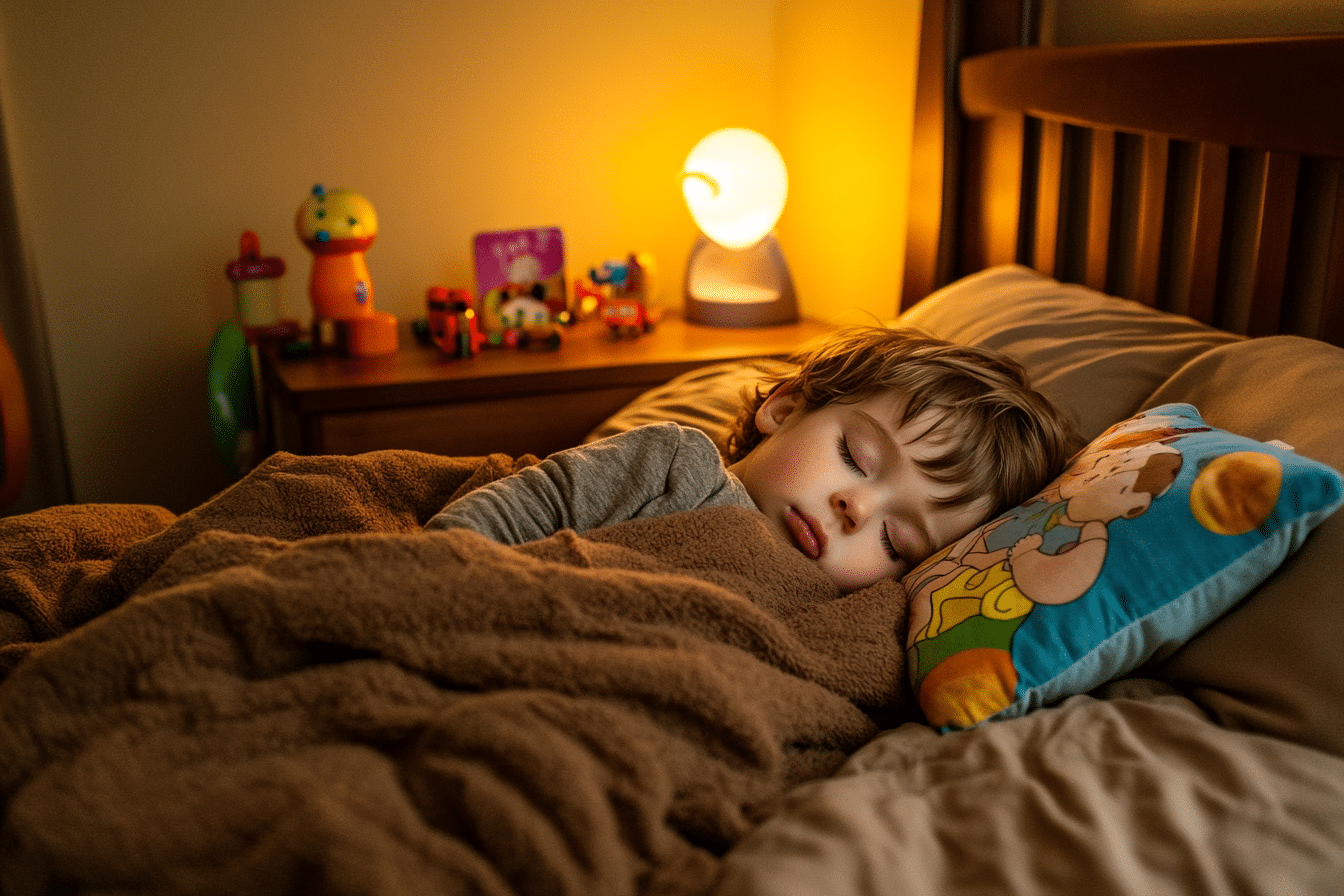Bringing a newborn home is such a special time, filled with love, wonder, and… well, let's be honest, a lot of sleepless nights! It's no secret that we new parents often struggle with exhaustion as we try to figure out our baby's sleep patterns. I know I did! And in those early weeks, it's easy to start worrying if our little ones are sleeping “enough” or “correctly”. As a pediatrician and a mom, I'm here to tell you that every baby is different, and what's considered “normal” can have a really wide range.
- Understanding Your Newborn’s Sleep
- Sleep and Your Baby’s Development
- Sleep Stages in Newborns: REM and Non-REM
- Typical Newborn Sleep Duration and Frequency
- Your Newborn’s Alert Phases
- Feeding and Sleep: What’s the Connection?
- Mom’s Sleep Matters Too!
- Common Newborn Sleep Concerns
- Creating a Safe and Supportive Sleep Environment for Your Baby
- Strategies for Better Sleep: Tips from One Mom to Another
- Taking Care of Yourself: Because You Matter Too
- When to Seek Professional Help for Your Baby’s Sleep
- Conclusion: You’ve Got This, Mama!
Understanding Your Newborn's Sleep
You might be surprised to hear that newborns spend most of their day asleep, typically between 11 to 19 hours! But unlike us adults who like those long, uninterrupted stretches of sleep, newborns sleep in short bursts, usually ranging from 1 to 4 hours. This means they're waking up frequently throughout the day and night, mostly because they're hungry. It can feel disruptive, but I promise it's perfectly normal and actually essential for their growth and development.
Sleep and Your Baby's Development
Sleep isn't just about resting; it plays a huge role in your newborn's brain development. While they sleep, their little brains are busy processing information, making connections, and storing memories. Getting enough sleep supports healthy brain growth and sets the stage for future learning and development.
Sleep Stages in Newborns: REM and Non-REM
Just like us, newborns go through different sleep stages, but theirs are a bit unique. At first, their sleep is mainly divided into two types:
- Active Sleep (REM Sleep): This is a light sleep where you might see their eyes moving rapidly, some twitching, and even irregular breathing. Newborns spend about half their sleep time in this active state. They might even smile or make little noises, which I always found so adorable! It is thought to play a role in brain development.
- Quiet Sleep (Non-REM Sleep): This is a deeper sleep where they're still and their breathing is more regular. As they get older, this quiet sleep starts to resemble ours, with four different stages.
Around 3 months old, you'll notice they spend less time in active sleep and more in quiet sleep. Their sleep cycles also get longer, and they start developing a more adult-like sleep pattern.
Typical Newborn Sleep Duration and Frequency
While every baby is different, here's a general idea of what you might expect when it comes to their sleep. The important thing to remember is that this is just an average, and your newborn sleep patterns might vary.
| Age (months) | Total Daily Sleep (hours) | Daytime Sleep (hours) | Nighttime Sleep (hours) | Number of Naps | Average Nap Length (hours) |
|---|---|---|---|---|---|
| 1 | 14-17 | 8 to 9 | 7 | 4-5 | 1.5-2 |
| 3 | 12-15 | 9 to 10 | 4 to 5 | 3-4 | 1.5-2.5 |
| 6 | 11-14 | 10 | 4 | 2-3 | 2-3 |
| 9 | 11-14 | 11 | 3 | 2-3 | 2-3 |
| 12 | 10-13 | 11 | 3 | 1-2 | 2-3 |
It can fluctuate from day to day. And get this, studies have shown that babies from Asian countries tend to sleep a bit less than those from Caucasian countries. Isn't that interesting?
The National Sleep Foundation suggests the following for daily sleep:
- Birth to 3 months: 14–17 hours
- 4 to 11 months: 12–15 hours
- 1 to 2 years: 11–14 hours
- 3 to 5 years: 10–13 hours
Your Newborn's Alert Phases
Throughout the day, your newborn will go through different alert phases. Recognizing these can really help you understand what they need:
- Quiet Alert: They're calm and attentive, just taking in the world around them. This is a great time to interact and bond with your baby.
- Active Alert: They're more active, moving their arms and legs, making sounds, and exploring.
- Crying: This is their way of telling you they need something, whether it's food, a diaper change, or maybe they're just feeling overwhelmed.
Feeding and Sleep: What's the Connection?
How often your newborn feeds can affect their sleep. Breastfed babies often wake up more frequently because breast milk is digested faster. Plus, it contains hormones that make both of you sleepy! As your baby grows and their tummy gets bigger, they'll be able to go longer between feedings, which means longer sleep stretches for everyone. My second baby was like that, she would sleep for four hours at 3 months old already!
Mom's Sleep Matters Too!
This is something I find really interesting: research has shown a link between a mother's sleep and her baby's sleep. Moms who get less sleep tend to have babies who also sleep less. It just goes to show how important it is for us to prioritize our own well-being and seek support so that both of us can get the rest we need.
Common Newborn Sleep Concerns
Many of us worry about certain sleep issues with our newborns. Here are a few common ones:
- Day-Night Confusion: Newborns haven't developed a clear day-night rhythm yet, so they might be more awake at night and sleepier during the day. This usually sorts itself out as they get older.
- Frequent Night Wakings: Because their tummies are tiny, newborns need to feed every few hours, even at night. This is totally normal and necessary for their growth.
- Difficulty Self-Soothing: Some newborns have a hard time falling asleep on their own and might need our help to settle. This is often because they need that extra comfort and security that only we can provide.
- Sleep Apnea: This is when a baby's breathing repeatedly stops or slows down during sleep. While occasional pauses can be normal, it's important to talk to your doctor if you notice prolonged episodes or other symptoms like snoring, labored breathing, or gasping. Premature babies and those with certain medical conditions are at higher risk.
Creating a Safe and Supportive Sleep Environment for Your Baby
Creating a safe sleep environment is so important for our little ones. Here are some key tips:
- Back to Sleep: Always place your baby on their back for every sleep, both naps and nighttime. This is one of the best things you can do to reduce the risk of Sudden Infant Death Syndrome (SIDS).
- Firm Sleep Surface: Use a firm, flat mattress in a safety-approved crib or bassinet. Avoid soft surfaces like couches or adult beds.
- Clear the Crib: Keep the crib free of loose blankets, pillows, bumpers, and soft toys. These can be suffocation hazards.
- Room-Sharing: It's recommended to keep your baby's sleep area in the same room where you sleep for at least the first six months. While room-sharing is encouraged, bed-sharing is not. It's safest for your baby to have their own separate sleep space.
- Avoid Overheating: Make sure your baby's room is a comfortable temperature and avoid overdressing them. Overheating is a risk factor for SIDS.
- Smoke-Free Environment: Exposure to smoke, both during pregnancy and after birth, increases the risk of SIDS. Creating a smoke-free environment is crucial.
- Co-sleeping: There's a lot of debate about co-sleeping, where the baby shares the same bed with the parents. While some cultures practice it, there are potential risks like accidental suffocation. If you choose to co-sleep, it's really important to take precautions to make it as safe as possible.
Strategies for Better Sleep: Tips from One Mom to Another
While you can't force a newborn to sleep on a schedule, there are things you can do to encourage healthy sleep habits:
- Establish a Bedtime Routine: A consistent routine, like a warm bath, massage, and quiet time, can signal to your baby that it's time to wind down. Maybe add a story or a lullaby.
- Create a Calming Sleep Environment: Dim the lights, reduce noise, and keep the room at a comfortable temperature. White noise or calming music can also help.
- Swaddling: This can help newborns feel secure and fall asleep more easily. Just remember to stop swaddling once your baby shows signs of rolling over.
- Tummy Time: During the day, supervised tummy time helps your baby develop strong muscles and can also improve sleep quality.
- Respond to Cues: Pay attention to your baby's sleep cues, like rubbing their eyes or yawning. Try putting them down when they're drowsy but still awake. This helps them learn to associate their crib with falling asleep.
- Sleep Training: This is more for older babies, but it's worth mentioning. If your little one is still struggling with sleep after several months, sleep training might be an option. There are different methods, so it's about finding one that works for your family.
- Sleep Regression: As your baby grows, they might go through periods of sleep regression, where their sleep patterns change. This is often related to developmental milestones. Just be patient and consistent with your sleep routines during these times.
- Responsive Care: While routines are helpful, it's also important to be responsive to your baby's individual needs. Sometimes they just need extra comfort. Trust your instincts and adapt your approach as needed.
Taking Care of Yourself: Because You Matter Too
Dealing with newborn sleep challenges can be tough on us parents. It's so important to prioritize self-care so you can cope with sleep deprivation and stay healthy, both physically and emotionally. Here are a few things that helped me:
- Rest When Possible: Try to sleep when your baby sleeps, even if it's just for short naps.
- Share Responsibilities: If you have a partner, take turns with nighttime duties so each of you can get some rest.
- Accept Help: Don't be afraid to ask for help from family or friends with chores or baby care.
- Practice Good Sleep Hygiene: Create a relaxing bedtime routine for yourself, avoid caffeine and screens before bed, and try to keep a consistent sleep schedule.
When to Seek Professional Help for Your Baby's Sleep
While most newborn sleep variations are normal, there are times when it's a good idea to talk to a healthcare professional:
- Sudden Changes in Sleep Patterns: If your baby suddenly starts waking up much more often or has trouble falling asleep when they didn't before, it could be a sign of something else going on, like an ear infection or a growth spurt.
- Excessive Sleepiness: If your baby seems unusually sleepy and is hard to wake up for feedings, it's important to seek medical advice.
- Concerns about Baby's Sleep: If you're feeling overwhelmed or anxious about your baby's sleep, don't hesitate to reach out to your pediatrician or a child health nurse. They can offer guidance and reassurance. I know I called mine several times during those first few months!
Conclusion: You've Got This, Mama!
Navigating the world of newborn sleep can be challenging, but understanding their sleep patterns and having realistic expectations can make a big difference. Remember, every baby is unique, and what's “normal” can vary a lot. By creating a safe sleep environment and using gentle sleep strategies, you can help your little one (and yourself!) get the rest you need. Trust your instincts, be patient, and don't be afraid to ask for support. You're not alone on this journey, and you're doing an amazing job!
What are your experiences with newborn sleep? Any tips you'd like to share? Leave them in the comments below!











